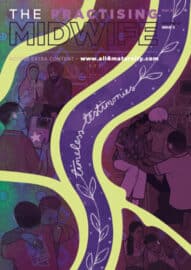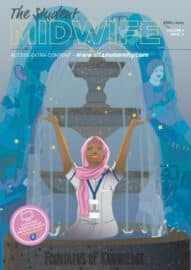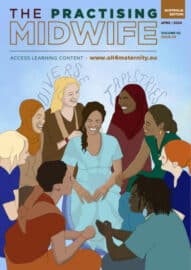Neurodiversity and Maternity 1. Hidden Barriers to Healthcare Access
Joanna Grace, Founder – The Sensory Projects
Published in The Practising Midwife Volume 24 Issue 2 February 2021 https://doi.org/10.55975/SRAP4956
Summary
Autism is a hidden condition, and the barriers to healthcare access faced by autistic people are similarly hidden. Barriers such as communication differences, differences in pain registry and expression and sensory differences are not just present for autistics with high support needs but can have an impact across the autistic spectrum. Here Joanna Grace introduces a series of three articles focusing on why it is important for practitioners to be aware of the impact of neurodivergence on the experience of care in order for these barriers to be overcome.
Introduction
My name is Joanna. I have a husband and two young children. I live with them and a cat and a dog in our home in rural Cornwall. I used to work as a special school teacher. Now I run my own business providing training for those supporting people with profound and multiple learning disabilities. I am a published author, with six books published and a seventh due to come out in 2021. This mini-rundown on my life is here to let you know I am a competent human being. It is a rundown I feel obliged to give because of the diagnosis I have.
Hidden barriers to healthcare access
Health wise, I always notice the doctor’s shoulders relax a little when I report that I have never smoked, rarely drink, eat a balanced diet with plenty of fruit and veg and take regular exercise. No one in my family has a history of any nasty illnesses. I am never ill but I am likely to die significantly younger than my peers because I have a condition that means I face barriers to accessing healthcare.
Until recently, I had been only mildly aware of these barriers. As someone who has had little reason to call for medical assistance, I’ve rarely been in a position to confront them. This changed with my most recent pregnancy and post-partum care, where, on a couple of occasions, barriers to healthcare endangered my life and the life of my unborn child.
What is this condition?
Well, I am autistic. That’s why I felt obliged to give you a mini CV at the top of the article. I worry that when I say I am autistic, you will make certain assumptions about me and my capabilities. Of course, I do not look autistic – what does an invisible condition look like? In day-to-day life, I do not act autistic – again, one could question what that would be, but here I mean I do not do things that would set me apart from anyone else in your care.
You might say that I am ‘not very autistic’, or I am a ‘high-functioning’ autistic. Both of these phrases are hotly rejected by the autistic community, who prefer that I am described as having low support needs. Despite rarely conforming to what others thing of as being autistic, I am in fact pretty typical of a female autistic diagnosed in later life, in that I have learned social skills and can do a reasonably good impression of neurotypical. You are unlikely to spot my autism unless I disclose it or unless you notice it on my notes. But if you do spot it and, more importantly, recognise it as significant, you do something akin to providing a ramp to a wheelchair user in terms of my access to healthcare.
Sharing my experiences

I am going to use my own experience to explore with you some of the barriers to healthcare faced by the neurodivergent community in a further two articles that will focus on breastfeeding. But for now, here are a few things to get you thinking about neurodivergent access to healthcare. Autism is a spectrum condition so other autistics are likely to, but will not necessarily, experience these things:
- I express pain differently – do you ever use expressions of pain to diagnose or assess someone? Do you know what my expression of pain would look like?
- I sense pain differently – do you rely on patients self-reporting pain? What if I cannot accurately report the pain in my body?
- I process spoken language differently – are you giving information verbally that I need to have in order to keep myself safe, for example, telling me I can call a particular number if I need help, or telling me that if X happens I should treat it with Y?
- My capability to articulate my own experience diminishes when I am stressed – the person you meet in the appointment may be able to have a ‘normal’ conversation with you, but will that person be able to call for help when they need it?
- My capacity to process language on the telephone is limited – is my access to healthcare contingent on me being able to manage a telephone conversation?
A study conducted in Scotland by Rydzewska et al in 20191 found that autistic adults are five times more likely than the general population to be in poor health. It noted the intersectionality of autism with age and gender, finding that being female, older and autistic all increased one’s chances of poor health. The study drew the shocking conclusion that autism has a greater influence on poor health than aging does. Autistic people also face significantly increased risks of mental ill health and are far more likely than neurotypicals to die by suicide.
With findings like the above, it would be easy to conclude that autism causes a vulnerability to physical and mental ill health. This is absolutely not the case. The risks do not stem from the neurodivergent brain, they stem from the communication divide between neurotypicals and neurodivergent people. This divide is not solely a failure of autistics to understand neurotypicals, it is also a failure of neurotypicals to understand autistics, as beautifully illustrated by Damien Milton’s Double Empathy work.2 It is a divide I hope to go some way to helping you overcome in the upcoming articles. TPM
References
- Rydzewska E, Hughes-McCormack L, Gillberg C et al. General health of adults with autism spectrum disorders – A whole country population cross-sectional study. Research in Autism Spectrum Disorders. 2019;60:59-66.
- Milton D. On the ontological status of autism: the ‘double empathy problem’. Disability & Society. 2012;27(6):883-887.









